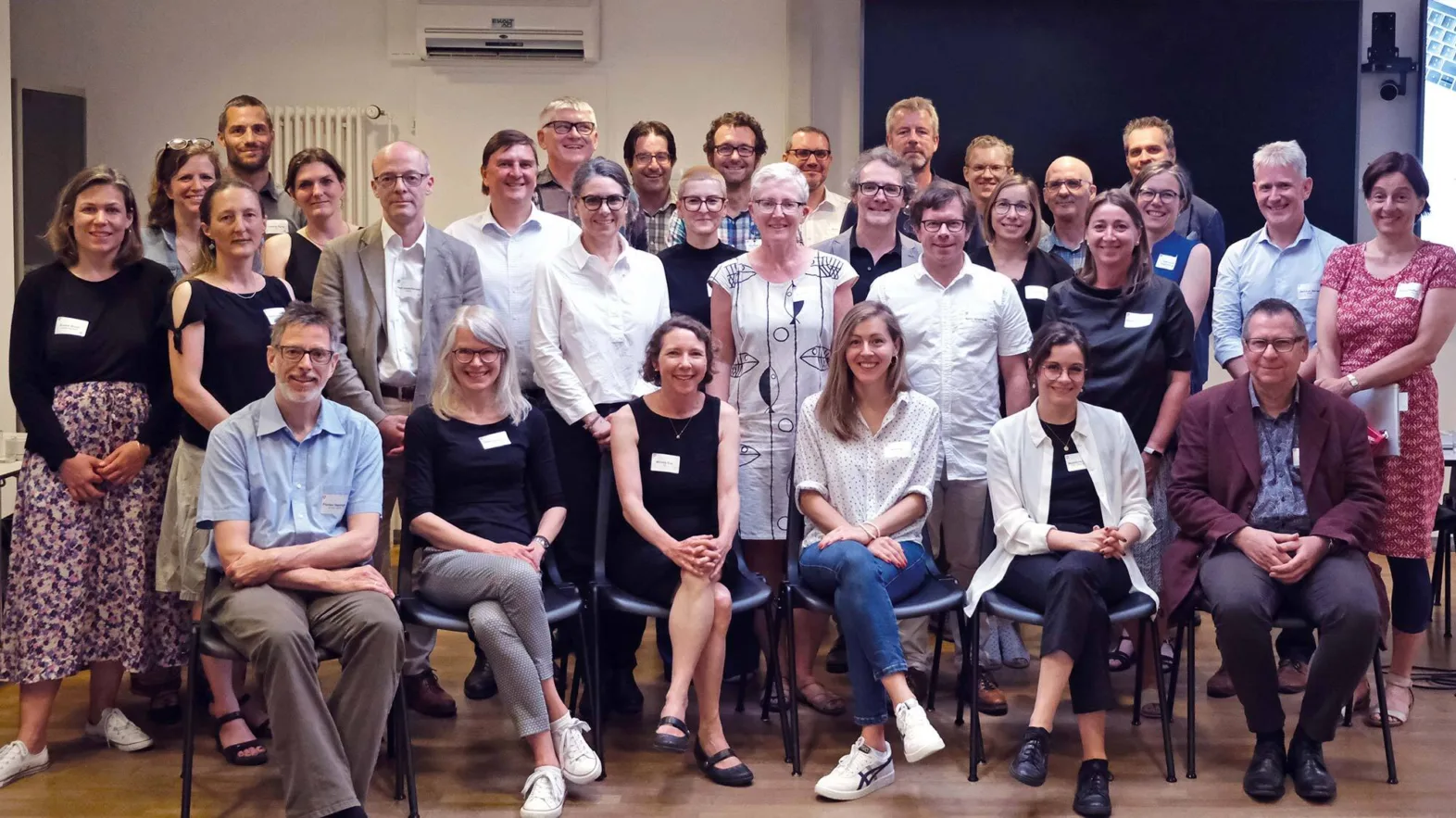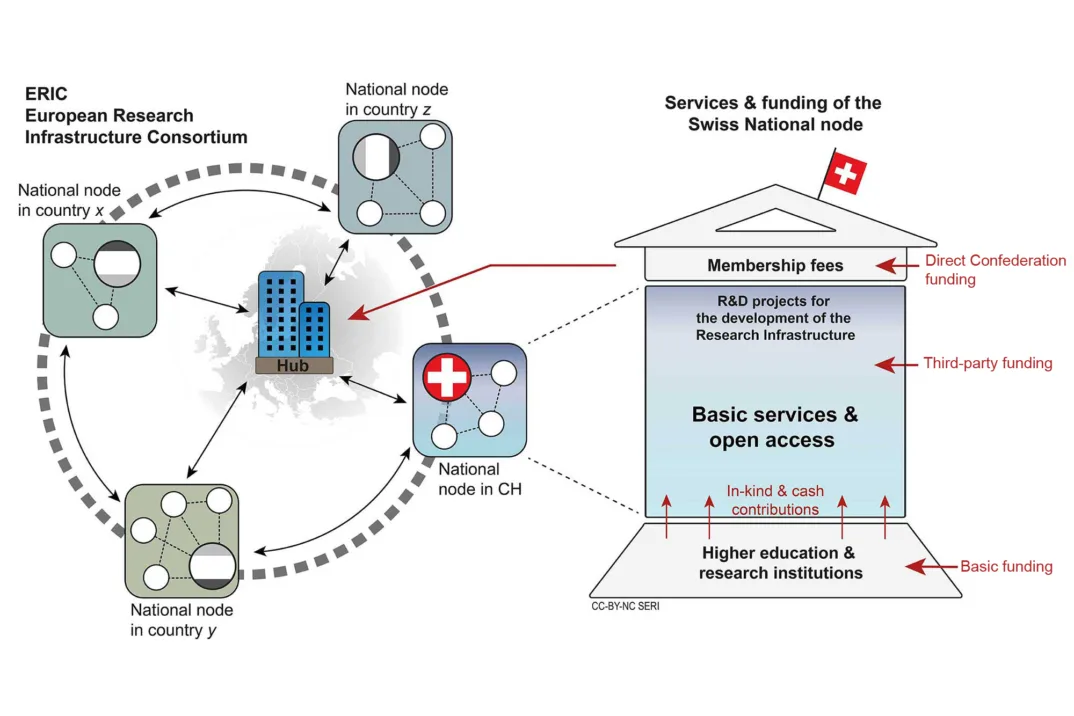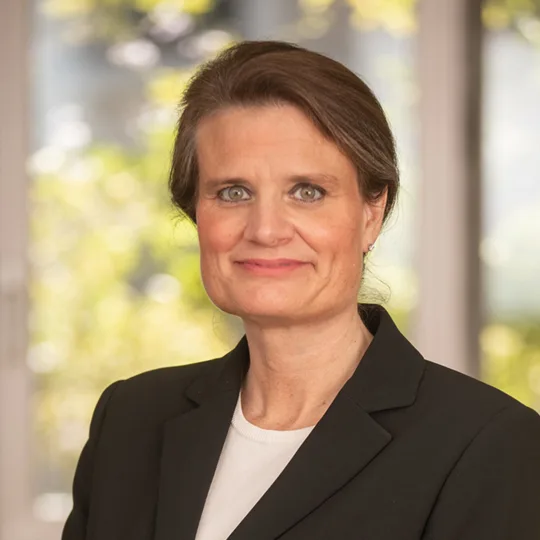Swiss membership in international research infrastructure networks
Since the summer of 2023, Switzerland has been a member of six European Research Infrastructure Consortiums. International research infrastructures facilitate international cooperation on socially relevant issues and provide scientific and technological momentum that has a global impact.

The European Strategy Forum on Research Infrastructures (ESFRI) defines research infrastructures as facilities, resources and services that are used by the research communities to conduct high-quality research and foster innovation in their fields. They also produce important scientific output – mostly data – for other areas, such as education or public services. Research infrastructures is a broadly defined concept that varies depending on the scientific discipline. This concept may encompass the following: major scientific equipment or (measurement) instruments, knowledge-based resources (e.g. collections, archives and scientific data), and e-infrastructures (e.g. data and computing systems and communication networks).
A distinction is drawn between research infrastructures located in a single location (‘single-sited’) and those that are spread out over several locations (‘distributed’). The latter are comprised of several existing national research infrastructures housed at higher education institutions or non-commercial research institutes. These national nodes together form a research infrastructure network and their activities are coordinated through a central hub located at one of the national nodes. Most ERICs are distributed research infrastructures. The international networking of national research infrastructures enables synergies to be exploited and national investments already made in their respective facilities to be utilised, thereby generating economies of scale.
What is an ERIC?
In order to facilitate the establishment and operation of research infrastructure networks, the European Union introduced the legal form 'European Research Infrastructure Consortium', ERIC for short, in 2009. As a legal entity, ERIC provides recognition of the participation of EU member states, associated countries, other non-associated countries and intergovernmental organisations in a given research infrastructure. Switzerland is thus able to continue taking part in international research infrastructures through ERICs.
Generally speaking, ERIC operation is made possible thanks to staff, in-kind contributions and funding from the institutions where the national nodes are located. In addition, ERIC member countries pay membership contributions. This often finances the coordination and standardisation activities of the ERIC's central hub. Membership fees are limited to between CHF 50,000 and 150,000 per year since the national hubs in member countries of the respective ERIC are already established and funded national research infrastructures.
ERICs are also an important driver in the development and implementation of FAIR data (findable, accessible, interoperable, reusable), which is intended to facilitate the findability, accessibility, interoperability and reuse of research data for research, business, policymaking and society. In Switzerland, ERICs significantly contribute to the anchoring and further elaboration of Switzerland's national strategy for Open Research Data (ORD) and corresponding guidelines for the promotion of 'FAIR research data by design'.
In 2011, the Survey of Health, Ageing and Retirement in Europe (SHARE) was the first European research infrastructure network to be given the legal status of ERIC: Switzerland was also involved, having held observer status in SHARE from the very beginning. Since then, the European research infrastructure landscape has grown steadily and today already comprises 26 ERICs - with more over the horizon. Apart from Switzerland's membership in the European Spallation Source ERIC in Lund in 2015, which is a 'single-sited' research infrastructure, observer status was for the longest time the only form of Swiss participation in an ERIC. This has now changed.
Unanimous adoption of ERIC Dispatch
On 13 April 2022, the Federal Council submitted its Dispatch to the Swiss Parliament on Swiss membership in six international research infrastructure networks conferred the legal status of ERICs. With this step, Switzerland was able to change its status from that of an observer to member. The ERIC Dispatch also proposed an amendment to the Federal Act on the Promotion of Research and Innovation (RIPA), whereby decision-making authority on Switzerland's membership in an ERIC would no longer lie with Parliament, but with the Federal Council. This amendment will enable Switzerland to move and position itself more agilely in the rapidly changing research infrastructure landscape.
The Federal Council has proposed Swiss membership in six ERICs from different scientific fields: two in the field of environmental sciences, two in the field of life sciences and health, and two in the field of humanities and social sciences. This selection is based on the 2019 Swiss Roadmap for Research Infrastructures and on an in-depth evaluation based on a range of different criteria.

On 16 December 2022, the Swiss Parliament adopted the resolutions contained in the ERIC Dispatch, thereby approving Switzerland's membership in the six ERICs and the proposed amendment to RIPA. With unanimous approval of this bill, the Federal Assembly made a major commitment to preserving Switzerland's position as a location for research, innovation and higher education. Once the referendum period for the two federal decisions had expired, Switzerland, represented by SERI, applied for membership in the six ERICs. In the spring and summer of 2023, the six General Assemblies unanimously approved Swiss membership.
Preliminary work needed to get started
Membership in the six ERICs is an important milestone. Switzerland now has voting rights in the steering committees of these ERICs and can thus actively contribute and help shape the future. SERI staff will represent Switzerland at ministerial level at the ERIC general assemblies.
SERI has set up a new team to handle ERIC-related tasks. In addition to providing ministerial representation at ERIC general assemblies and providing support and advice to Swiss nodes - including potential future ERICs - this team will also be responsible for coordinating the activities of the various national stakeholders involved, including the researchers who operate national nodes and 'manage' data as well as the higher education institutions and research organisations where the national focal points are located. The Swiss National Science Foundation (SNSF), the Swiss Academies of Arts and Sciences and several federal offices are also involved.
In June 2023, SERI sent out an invitation to the first Annual ERIC CH Symposium for Research Infrastructure Networks. Highlights of the symposium were the 90-second pitches made by the national nodes of existing and future ERICs as well as a keynote speech given by Antje Keller, Chair of the European ERIC Forum. Equally appreciated were the lively discussions and interactions during a World Café gathering.
Swiss membership in six ERICs
- The European Plate Observing System (ERIC EPOS) provides access to services and a range of multidisciplinary geoscientific data that can be used and reused. EPOS collects data on physical and chemical processes taking place on Earth (e.g. earthquakes, volcanic eruptions or tsunamis) and studies processes that influence the tectonics and dynamics on the Earth's surface. The Swiss EPOS ERIC node is housed at the Swiss Seismological Service at ETH Zurich (SED ETH).
- The Integrated Carbon Observation System (ICOS ERIC) coordinates long-term observations of the concentration and flows of greenhouse gases. Data are collected from the monitoring sites in various ICOS ERIC member countries. Housed at ETH Zurich, the Swiss node of ICOS-CH coordinates the monitoring sites in Davos and on the Jungfraujoch. ICOS observations lead to a better understanding of the carbon cycle and help policymakers in their efforts to reduce greenhouse gas emissions at European level.
- The Consortium of European Social Science Data Archives (ERIC CESSDA) has created a network of social science data archives from 21 different European countries, which provides researchers with access to research project data across national borders and opens the way for the development of data, metadata and thesauri standards. The CESSDA Data Catalogue forms the core of this ERIC. It contains descriptions (metadata) of more than 40,000 data collections from CESSDA providers. The Swiss node of CESSDA is located at the Swiss Centre of Expertise in the Social Sciences (FORS).
- Digital Research Infrastructure for the Arts and Humanities (DARIAH ERIC) is the European network for digital research infrastructures in the arts and humanities. Currently comprised of 20 member countries, this network develops and advocates research practices based on information and communication technologies and helps researchers to use digital resources across the data lifecycle. The DARIAH-CH consortium coordinates the corresponding activities in Switzerland, with the national node located at the Swiss National Data and Services Center for the Humanities (DaSCH).
- European Clinical Research Infrastructure Network (ECRIN-ERIC) advises and assists researchers involved in transnational multicentre clinical trials to ensure a proper application of the 'good clinical practice' principles. The Swiss Clinical Trial Organisation (SCTO) serves as the Swiss national node. This nationally coordinated clinical research infrastructure comprises the clinical trial units of six Swiss university hospitals and two cantonal hospitals. Since joining as an observer country in 2015, Switzerland has been involved in numerous ECRIN activities, including more than twenty transnational clinical trials and infrastructure projects, including platform studies on COVID-19.
- Biobanking and Biomolecular Resources Research Infrastructure (BBMRI-ERIC) is a European coordination platform for biological databases. The Swiss Biobanking Platform (SBP) is the Swiss national node of BBMRI-ERIC and acts as central interface connecting Swiss human and non-human biobanks with the European network. With currently 84 biobanks, SBP is the leading national research infrastructure for biobanking activities in Switzerland. SBP is the result of an initiative taken by the Swiss National Science Foundation (SNSF) to address the growing needs of biomedical and biological researchers for greater quality, access, transparency and networking of biobanks for research purposes.
Contact
Author



